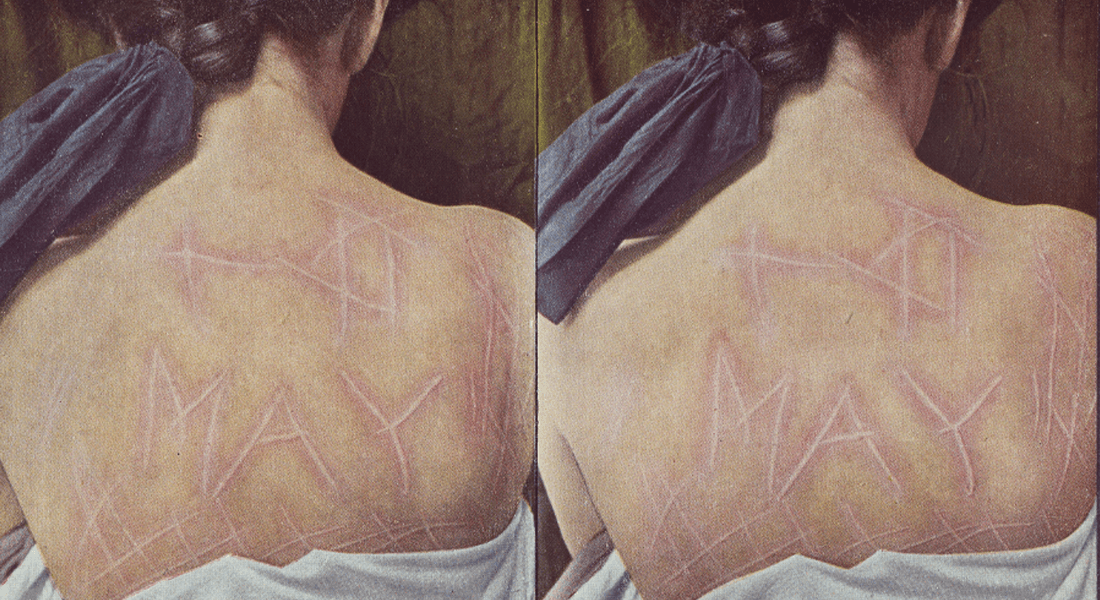Skin Manuscripts
International conference at the University of Copenhagen.

Not only is human skin our largest biological organ. It's also “a potentially ever-changing personal tapestry that tells the world about who we are or who we want to be” (Jablonski, 2006).
It bears witness to the toll of years but also to joy, violence, and trauma. Consequently, our understanding of skin extends far beyond a conceptual description that attempts to reduce it to its empirical nature. Rather, dermal phenomena need to be understood in terms of complex connections between medicine, anthropology, biology, psychology, culture, and cultural practices such as reading and writing (literature) and art. Skin has long been a unique canvas for the study of cultural and social phenomena. The ‘legibility’ of skin manuscripts, a term yet to be established, continues to provide important insights into the interrelated narratives of philosophy, anthropology, medical history, literature, and art. Historically, the study of human skin has relied heavily on both images and detailed (clinical) descriptions to document and diagnose disease, thus proving to be an inexhaustible resource for exploring fundamental philosophical and aesthetic ideas that are intimately intertwined with the context of European intellectual history as well as European colonialism and racism.
In dialogue with approaches from various disciplines, this international workshop will bring together reflections on new technologies, on the history of our changing assumptions about what (human) skin is, with a wide range of literary and artistic representations of the ‘skins’ we all inhabit.
Programme
| 18:00 - 19:15 | Conference opening at the Medical Museion (Invitation only) Words of Greeting by Ken Arnold (Director of the Medical Museion) Keynote by Giovanni Aloi (Chicago): Plant-skin and the scars on a cactus. |
| 9:00 | Welcoming Remarks – Irina Hron and Christian Benne Words of Greeting by Robert William Rix (Copenhagen) |
Section 1: Skin Through Time: Conceptualizations of Skin and Writing
Chair: Alexander Knopf (Heidelberg)
| 9:15 - 9:50 | Irina Hron (Copenhagen): The Stuff That Skin Is Made Of |
| 9:50 - 10:30 | Christian Benne (Copenhagen): Genetic pact. The historical graphordance of skin |
| 10:30 - 10:50 | Coffee break |
| 10:50 - 11:30 | Nicole Nyffenegger (Bern): Writing and Reading Skin: Methods and Complications |
| 11:30 - 12:10 | Charles Lock (Copenhagen): The Binding and the Bound |
| 12:10 - 13:30 | Lunch (Food & Co. – Wicked Rabbit) |
Section 2: Skin Stories: Writing (on) Skin
Chair: Irina Hron (Copenhagen)
| 13:30 - 14:10 | Elena Fabietti (Regensburg): Skin of Glass. History of a Fiction |
| 14:10 - 14:50 | Alexander Knopf (Heidelberg): »Nesselschrift«. The poetic function of skin in Paul Celan’s work |
| 14:50 - 15:15 | Coffee break |
| 15:15 - 15:55 | Julia Benner (Berlin): Stories in Skin. Tattoos, Skin Books and Skin Politics in Alice Braodway's Ink-Trilogy |
Section 3: From Head to Toe: All the Pretty (Human) Skins
Chair: Christina Fogarasi (Copenhagen)
| 16:10 - 16:50 | Nora Grundtner (Innsbruck): Swarz, rûch, wilde: Hair and Human Skin in a Selection of Ancient and Medieval Literature |
| 16:50 - 17:30 | Katie L. Walter (Sussex): Calloused Feet: Towards a History of Medieval Skin as Texture |
| 9:00 - 9:40 | Julia Schöll (Braunschweig): Touching Skin: The Cultural Philosophical Discourse on Haptics |
Section 4: Canvas and Stage: Portraying the Skin and the Body in Art
Chair: Ken Arnold (Copenhagen)
| 9:40 - 10:20 | Edward Payne (Aarhus): Flaying in Legend, Art, and Anatomy: Political Skin and Social Identity in Gerard David’s Judgement of Cambyses |
| 10:20 - 10:40 | Coffee break |
| 10:40 - 11:20 | Laura Katrine Skinnebach (Aarhus): A Protective Derma Relic – the caul as manuscript page in Early Modern Europe |
| 11:20 - 12:00 | Karly Etz (Selinsgrove): Inked Identities and Patriotic Skins – The Impact of Lithographic Prints on Regimental Tattoo Design during the American Civil War |
| 12:00 - 12:45 | Roundtable: Skin studies and future collaborations |
| 12:45 - 14:00 | Lunch (Food & Co. – Wicked Rabbit) |
Section 5: From Medicine to Microbiome: Dermatology and Technology
Chair: Astrid Pernille Jespersen (Copenhagen)
| 14:00 - 14:40 | Liv Eidsmo (Stockholm): The skin carries local memories |
| 14:40 - 15:20 | Adam Bencard (Copenhagen): Everyone is an island – the human body as microbial landscape in art and science |
| 15:20 - 15:45 | Coffee break |
| 15:45 - 16:25 | Emily Newton-Tanzer (Munich): The Diegesis of Skin: The Path from Inspection to Introspection in the Clinical Narrative |
| 16:25 - 17:05 | Andrea Bachner (Cornell): The Cinematic Skin Complex: Marked Skin in/as Film |
| 17:05 - 17:30 | Summary & Outlook |
Map of South Campus
View directions.
View on map of the Faculty of Humanities - South Campus.
View map of South Campus (pdf).
Funding
![]()
"Skin Manuscripts" is funded by the Carlsberg Foundation, the Centre for Modern European Studies (CEMES), and the Department for English, German and Romance Studies.
